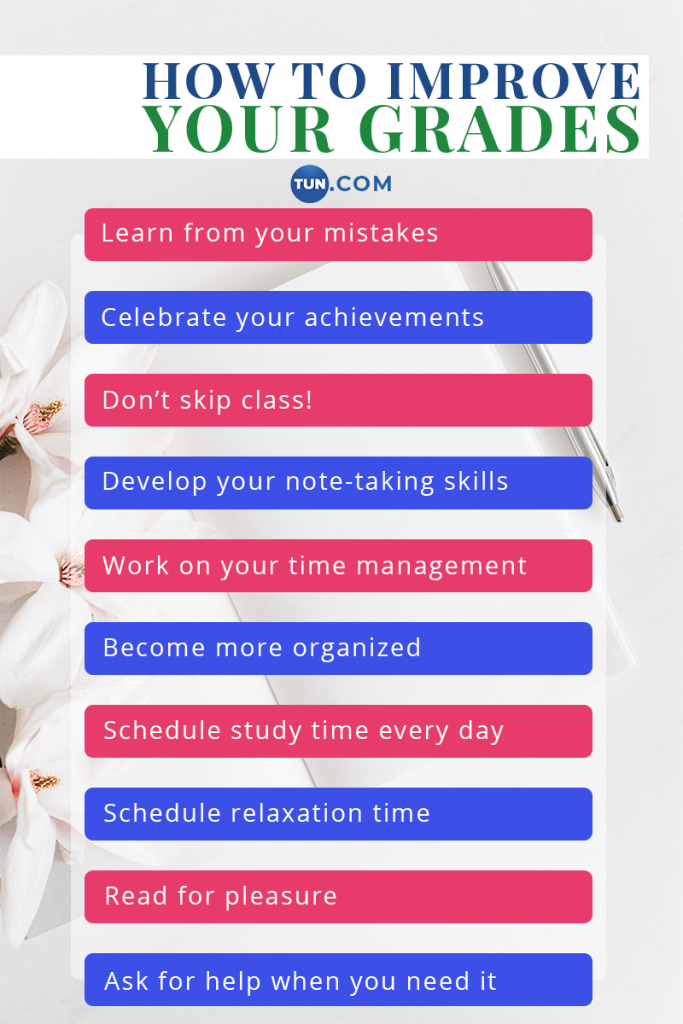When you are struggling in class, it can feel defeating. Even the best students can find themselves underperforming in a subject or stuck in an academic rut, where no matter how hard they try, they keep falling behind. In this situation, improving your grades can seem daunting, but it is not insurmountable. There are no shortcuts to a 4.0 GPA, but with a focused approach, you can make simple improvements in your study habits and mindset that will put you on the right track.
Whether you are at risk of failing or want to turn those B’s into A’s, here are simple steps you can take to help you improve your grades across the board.

Learn from your mistakes
We grow by learning from our mistakes. It is a cliché, but all too often, our educational culture seems to ignore this old adage. In American classrooms, mistakes are frequently either ignored or punished, and students fold under the pressure to be perfect as a result. Several studies have suggested that learning environments that encourage experimentation and problem solving help students learn better than those that practice more mistake-avoidant teaching methods.
So, rather than trying to minimize mistakes, work through them. Failure is part of the learning process — and an important one at that.
Celebrate your achievements
Many students who struggle academically also struggle with their self-worth. In a competitive academic culture, students frequently compare themselves to others and lose self-confidence if they don’t match up to their peers. Research has shown, however, that students who have greater self-confidence and self-worth have greater academic success. Moreover, students with higher levels of self-confidence may be less deterred by mistakes and failure.
In order to improve your self-confidence, it is important to set your own benchmarks for success and to celebrate even small improvements. Focus on incremental improvements rather than striving for perfection and reward yourself for your progress.
Don’t skip class!
It is all too common for students to skip classes. Over 50 percent of students at Brown University, for example, say they skip classes once per month. The average college student skips 240 classes over four years, equivalent to an entire semester’s worth of classes, at a cost upwards of $24,960.
And this problem is not limited to college students, either. According to a study by Harvard University, 24 percent of middle and high school students are chronically absent from their classes.
Higher attendance, however, is directly correlated with better grades, and the reasoning is apparent. When you attend class on a regular basis, you receive credit for attendance and participation, and more importantly, you don’t miss any course material. So if you’re in the contingent that is regularly skipping, improve your attendance and you will likely see your GPA improve as well.
Develop your note-taking skills
Effective note-taking is rarely taught in schools, which is unfortunate, because it is an essential skill in the classroom as well as the workplace. Note-taking is directly associated with improved grades, better retention of class material, and higher test scores. If you struggle with note-taking, there are three simple ways to improve your class notes:
• Take handwritten notes
It is increasingly common for students to take notes on their laptops or on tablets. However, recent research suggests digital note-taking may not be as effective as handwriting notes. Taking notes by hand reduces distractions and compels students to interpret lecture information rather than passively copying it verbatim, helping them absorb the material.
• Take as many notes as possible
Research shows that the more notes you take, the more information you retain. So don’t feel the need to be selective in your note-taking. Write down everything you can.
• Use visual aids
Don’t hesitate to spice your notes up with diagrams, sketches, and colors. Some studies suggest that sketching and drawing relevant information enhances memory, as does color coding.
Work on your time management
Effective time management is associated with greater academic performance and lower levels of student anxiety. Moreover, one study found that perceived control of time management is closely associated with these benefits. In other words, if you feel you have control over your time, you can expect to see these benefits.
Set your own time management goals and you may steadily see improvements in your GPA and feel less stressed about school.
Become more organized
Organizing your time and materials can help you declutter your mind and improve the productivity of your study sessions. Here are a few simple steps you can take to be more organized:
• Use a daily planner or agenda
Using an agenda will help you keep track of all of your responsibilities, making it easier to manage your time. In your agenda, you should make note of assignment deadlines, extracurricular activities, events, and daily tasks.
• Create homework and study checklists
Make daily checklists to keep track of assignments and make sure that you get through all of your daily tasks. Completing tasks on a checklist can also induce your brain to release dopamine, the pleasure chemical, turning tedious tasks into a joyful experience.
• Label and color code
Labeling and color-coding your notes, notebooks, documents, and other study materials will increase the efficiency and productivity of your study sessions. It also makes it easier to track down specific class materials and notes when you are studying.
• Clean your room!
Decluttering your personal space can help reduce stress and improve focus.
Schedule study time every day
Set aside a few hours each day to devote entirely to studying and working on assignments, even if you don’t have impending assignments due or an upcoming exam. Scheduling study time in advance will help you ensure that you stay on schedule with your school work. If you don’t have anything pressing to work on, you can use this time to begin working on assignments ahead of schedule and review material you’ve already covered. According to one study, high-performing students are more likely to schedule study time in advance and less likely to engage in negative study habits such as late-night cramming and procrastination.
Schedule relaxation time
Focused work beats overwork. If you make the most of your scheduled study time, there’s no reason why you can’t also find ample time to relax and socialize. Overwork can lead to fatigue and burnout. Give yourself time to decompress, and you may find that your productivity goes up.
Read for pleasure
Reading for pleasure has been associated with improved performance across all subject areas, as well as improved critical thinking, reading comprehension, and writing abilities. Yet less than 20 percent of students read a book, magazine, or newspaper for pleasure on a daily basis. We get it: when you’re assigned readings every day in school, the idea of picking up a book might not sound like relaxation. But the benefits of reading for fun are measurable and significant, and it is a good habit to build into your life.
Ask for help when you need it
Oftentimes, the students who need help are the least likely to ask for it. It is a phenomenon that has long perplexed teachers, many of whom try their best to reach out to those who need assistance. Students report a variety of reasons for avoiding seeking help. Some are intimidated by their teachers, some don’t know what to ask, and some say they don’t have the time outside of class. But asking for help is directly correlated with improved grades (for evidence, see one unofficial study by a chemistry teacher who tracked this phenomenon in his own classroom).
There’s more than one way to seek assistance. If you are intimidated by your teacher (you shouldn’t be, they are there to help), you can always ask your peers or seek tutoring outside of school.
Conclusion
Straight A’s don’t manifest overnight, but by putting effort into developing strong study habits, anybody can improve their grades.



